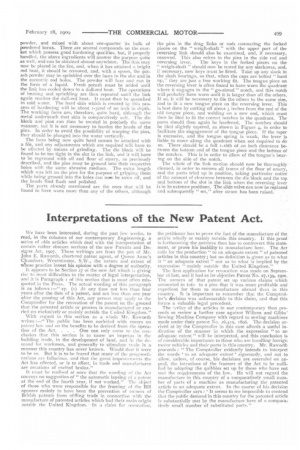Interpretations of the New Patent Act.
Page 21

If you've noticed an error in this article please click here to report it so we can fix it.
We have been interested, during the past few weeks, to read, in the columns of our contemporary Engineering, a series of able articles which deal with the interpretation of ceriain rather obscure sections of the new Patents and Designs Act, 1907. These writings are from the pen of Mr. John E. Raworth, chartered patent agent, of Queen .Anne's Chambers, Westminster, S.W., the nature and extent of wtose practice invest his opinion with a degree of authority. It appears to be Section 27 of the new Act which is giving rise to most difficulties in the matter of legal interpretation, and it is Paragraph t of this section that is most often misquoted in the Press. The actual wording of this paragraph is as follows :—" 27. (1) At any time not less than four years after the date of a patent, and not less than one year after the passing of this Act, any person may apply to the Comptroller for the revocation of the patent on the ground that the patented article or process is manufactured or carried on exclusively or mainly outside the United Kingdom."
With regard to this section as a whole Mr. Raworth writes :—" The public has been surfeited with essays on patent law and on the benefits to be derived from the opera
tion of the Act One can only come to the conclusion that this section is to cause an impetus in the building trade, in the development of land, And in the demand for workmen, and generally to stimulate trade in a manner this country has never known. Would that it were to he so. But it is to be feared that many of the prognostirations are fallacious, and that the great improvements the Act has effected, or is to effect, in trade and manufactures are creations of excited brains."
It must be realised at once that the wording of the Act conveys no suggestion of " the automatic lapsing of a patent at the end of the fourth year, if not worked." The object of those who were responsible for the framing of the Bill appears mainly to have been the prevention of owners of British patents from stifling trade in connection with the manufacture of patented articles which had their main origin autside the United Kingdom. In a claim for revocation,
the petitioner has to prove the fact of the manufacture of the article wholly or mainly outside this country. If this proof is ferthcoming the patentee then has to controvert this statement, or prove his inability to manufacture here. The Act calls for the production" to an adequate extent" of patented articles in this country; but no definition is given as to what is " an adequate extent " nor as to what is implied by the expression "mainly outside the United Kingdom."
The first application for revocation was made on September 16 last, and it had as its objective Patent No. 27,139, 1900. The owners of that patent set up various claims which amounted in foto to a plea that it was more profitable and expedient for them to manufacture abroad than in this country. It is important to remember that the Comptroller's decision was unfavourable to this claim, and that this Forms a valuable legal precedent.
The writer of the articles in our contemporary then proceeds to review a further case against Willcox and Gibbs' Sewing Machine Company with regard to sewing machines made under their patent No. 26,519, 1896. The decision arrived at by the Comptroller in this case affords a useful indication of the manner in which the expression "to an adequate extent " will be interpreted, and this conclusion is of considerable importance to those who are handling foreign motor vehicles and their parts in this country. Mr. Raworth proceeds : "The Comptroller evidently intends to interpret the words to an adequate extent ' rigorously, and not to allow, unless, of course, his decisions are overruled on appeal, the intentions of the framers of the Act to be nullified by adopting the quibbles set up by those who have not met the requirements of the law. He will not regard the manufacture in this country of a comparatively small number of parts of a machine as manufacturing the patented article to an adequate extent. In the course of his decision the Comptroller says : It seems to me impossible to contend that the public demand in this country for the patented article is substantially met by the manufacture here of a comparatively small number of substituted parts."
























